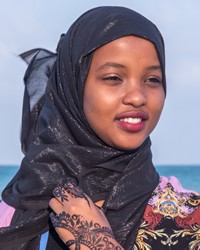Somali in Tanzania

Photo Source:
Copyrighted © 2025
MarosMatousek - Shutterstock All rights reserved. Used with permission |
Send Joshua Project a map of this people group.
|
| People Name: | Somali |
| Country: | Tanzania |
| 10/40 Window: | No |
| Population: | 80,000 |
| World Population: | 28,900,200 |
| Primary Language: | Somali |
| Primary Religion: | Islam |
| Christian Adherents: | 0.00 % |
| Evangelicals: | 0.00 % |
| Scripture: | Complete Bible |
| Ministry Resources: | Yes |
| Jesus Film: | Yes |
| Audio Recordings: | Yes |
| People Cluster: | Somali |
| Affinity Bloc: | Horn of Africa Peoples |
| Progress Level: |
|
Introduction / History
Several million Somali live scattered across eight countries in the northeastern portion of Africa, commonly called the "Horn of Africa," and in the Middle East. They are one of the most homogenous people groups in Africa, speaking a common language, adhering to a single faith and sharing a cultural heritage. Somalis first appeared in Africa around 1200 A.D. and began expanding westward and southward about 150 years later. They converted to Islam around 1550 under the influence of Arab traders. Today, many semi-nomadic Somalis live in northern Tanzania. This territory is characterized by its dry climate and sparse vegetation.
What Are Their Lives Like?
Somali society is based on the nuclear family, which consists of a husband, wife and children. The man is the head of his household and has the right to be married to four wives. The women are responsible for raising the children, although the men do take part in their religious training. Somalis emphasize respect for one's elders. A typical family owns a herd of sheep or goats and a few burden camels. The more camels a man has, the greater his prestige. The men's duties include herding and milking the camels, while the women and children tend to the sheep and goats. Both men and women help with the farming. Most of the crops they raise are for family consumption; however, the sale of surplus items in small markets provides important additional income for most families. Somali nomads travel from place to place according to the needs of their herds. They live in portable huts made of wooden branches covered with skins or grass mats. The huts are easily collapsible so that they can be loaded on pack animals and quickly moved. Their diet includes milk, camel and goat meat, rice, and other grains. Tea is also a favorite drink. Most of the Somali children in Tanzania attend school; but less than half of the Somali adults can read.
What Are Their Beliefs?
Somalis are virtually all Sunni Muslims, with Sufism (a mystic branch of Islam) providing an important religious experience for many. Somali Muslims recite the standard Islamic prayers. However, Somali women have never worn the required Islamic veil. Villagers frequently turn to the wadaad (a religious expert) for blessings, charms and advice in worldly matters. These people depend upon good works to pay the penalty for their sins. They depend upon the spirit world for their daily needs because they regard Allah as too distant. They believe that Allah may determine their eternal salvation, but the spirits determine how well they live in their daily lives. Consequently, they must appease the spirits. They often use charms and amulets to help them with spiritual forces.
What Are Their Needs?
Christian broadcasts and the JESUS Film are available in the Somali language, but little fruit has come from them. There is a need for missionaries who are sensitive to Muslim cultures to live and work among Somali people in Tanzania. We must send forth laborers into this harvest field.
Prayer Points
Pray for laborers!Ask the Holy Spirit to soften Somali hearts so they will become receptive to the gospel. Ask the Lord to raise up strong, reproducing church plants and a Disciple Making Movement among Somali people in Tanzania. Pray for the Holy Spirit to begin to touch the hearts of the Somali people in northern Tanzania as they watch the JESUS Film. Pray that Somali elders will understand that following Christ will mean taking the opportunity to trade in their tragic lives for ones that are lived to "the full."